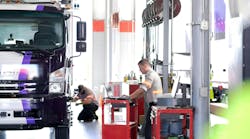Will the bullish feeling about the LTL business brought on by a strong first quarter continue? Most analysts agree that the answer is maybe.
A reduction in the number of terminals and an increase in revenue per terminal are both helping to make this industry segment shine. Some other factors, however, could lead to a short-lived recovery, according to speakers at a conference on the financial conditions of the trucking industry sponsored by the National Small Shipments Traffic Conference and held in Arlington, Va., last month.
John Larkin, managing director of Alex. Brown & Sons, warned that more hub bypassing systems can weaken network profitability if not properly managed. He also noted that home delivery has changed distribution patterns, and some LTLs may not be equipped to handle the change. In addition, shippers are continuing to find alternatives for freight traditionally given to LTLs.
Mergers and consolidation mean that "LTLs are competing against stronger peers," Larkin added.
Much of the continued upsurge in the LTL segment will hinge on the agreement reached with the Teamsters. Although company chiefs spoke about the advantages of having union workers -- low turnover, more experienced drivers, and fewer accidents -- they also understand the importance of cutting an economic deal. "We need a satisfactory conclusion to the IBT negotiations," warned Michael Wickham, president & CEO of Roadway Express.
Discussing the change in inventory management, William Zollars, president and CEO of Yellow Freight System, believes that LTLs are well-positioned for just-in-time requirements of customers. "There's a blurring of lines between logistics companies, LTLs, and others," said Zollars. The winners will be companies that are customer-focused, as opposed to those that are operationally focused, he said.
Understanding the new management of inventories is crucial to the success of shippers and LTLs in particular, said Robert Delaney, vice president of Cass Information Systems Inc. Delaney noted that the cost of the logistics supply chain in relation to gross domestic product dropped to 10.5%, the lowest level since 1960, when the data was first recorded. "Our transportation system has become less costly and more reliable," said Delaney.
Delaney said that companies will no longer rebuild inventories as they used to, and that shipping companies that don't believe this will fail. "Rebuilding of inventories is an old, tired notion," he said. "The value-added portion of inventory-in-motion is coming from the freight industry."
Thomas J. Donohue, who has advocated trucking's interest for the past 13 years as president and CEO of the American Trucking Assns., resigned last month to head the U.S. Chamber of Commerce, the nation's largest business federation. Donohue will assume his new post on September 1.
"He moved our industry into the big leagues in terms of its representation in Washington," said Charlie Ramorino, ATA's chairman. "Under Tom's leadership, ATA's membership has doubled and revenues have tripled. He has helped lead our industry to major improvements in safety, as well as significant legislative victories that have saved companies billions of dollars."
Ramorino has appointed a search committee to find Donohue's replacement.


